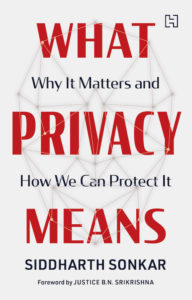
Publisher: Hachette Books
Rights: World rights available (excluding Indian subcontinent)
In 2020, when the coronavirus pandemic triggered governments across the world to instate lockdowns, several Indian states adopted digital contact tracing and the use of drones to monitor and map citizens. Although this paved the way for social control through surveillance becoming the ‘new normal’, rampant news about information leaks and breaches by apps, spy softwares and social media platforms have awakened Indian citizens to how their privacy is being persistently compromised. With inadequate and outmoded laws for privacy, and disparate institutions normalizing privacy violations of personal information in the name of national security, about individual data and the use it’s being put to have hit a peak.
In What Privacy Means, Siddharth Sonkar analyses the history and understanding – both cultural and political – of privacy in India and establishes why objecting to interference with privacy is the pressing need of the day. Taking a deep dive into the grating realities of individual privacy, he addresses crucial questions around how, in India, a citizen’s privacy is hardly ‘private’. In the process, he urges us to question whether in India, where boundaries between the personal and public are increasingly becoming blurred, relationships of trust between governments, corporations and individual citizens can at all be rebuilt.
Today, when our privacy is in the process of being invaded, constantly and insidiously, Sonkar’s incisive, revelatory and thought-provoking book provides a roadmap for everyone who is unsure of the rights they are entitled to as they continue to live their lives online.
The author: Siddharth Sonkar
